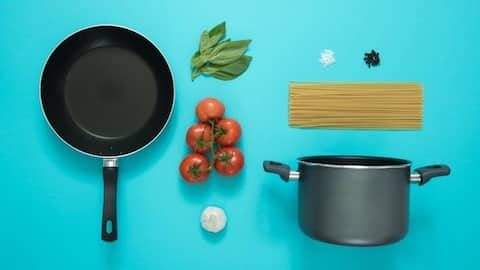Indian health council issues warning against non-stick cookware
What's the story
The Indian Council of Medical Research (ICMR) has issued a stern warning against the use of worn-out non-stick pans, particularly those coated with Teflon. The council's recent "Dietary Guidelines for Indians" report highlights the potential health risks associated with these utensils. Here's what the council says further.
Toxic release
Damaged Teflon pans pose significant health risks
Despite the 2013 phase-out of perfluorooctanoic acid (PFOA) in cookware, scratched or chipped Teflon pans still pose health risks. ICMR warns that these damaged pans can release significant amounts of toxic fumes and harmful chemicals into food when cooked at temperatures exceeding 170 degrees Celsius. Robert L Wolke, author of "What Einstein Told His Cook: Kitchen Science Explained", stated that "there's a whole chemistry set of compounds that will come off when Teflon is heated high enough to decompose."
Microplastic menace
Microplastics from non-stick pans linked to health issues
In 2022, an Australian study published in the journal Science of The Total Environment found that a single surface crack on a Teflon-coated pan can release up to 9,100 microplastic particles. New York-based physician Dr. Poonam Desai wrote in an Instagram video, "Non-stick pans that have been scratched or chipped...can leach millions of microplastics into our food." She added that these microplastics are endocrine disruptors and can cause hormone imbalances, fertility issues, and even increase the risk of cancer.
Safer options
ICMR recommends mud pots as safer alternatives
In light of the potential health risks, the ICMR has suggested using mud pots as a safer alternative to non-stick cookware. Non-stick pans, especially those coated with Polytetrafluoroethylene (PTFE), commonly known as Teflon, have been popular in Indian households for their convenience and easy cleaning. However, their safety has been questioned over the past decade due to concerns about the release of harmful chemicals during cooking.
Storage warning
ICMR advises against storing food in certain containers
In addition to advising against non-stick cookware, the ICMR has cautioned against storing acidic and hot food items in aluminum and iron containers. The council made an exception for brass and copper vessels. As alternatives, they recommended mud pots, granite stone utensils free from chemical coatings of PFOA, perfluorooctane sulfonic acid (PFOS), and PTFE, food-grade stainless steel, and well-maintained ceramic cookware.
Safety measures
Precautions for continued use of non-stick pans
For those who continue to use non-stick pans, Healthline suggests several precautions. These include not preheating an empty non-stick pan, using wooden or silicon ladles to prevent the coating from wearing off, and ventilating the kitchen as much as possible to get rid of fumes. Additionally, they recommend avoiding cooking on high heat and not stacking non-sticks over others to prevent rubbing and scrapping of coatings.
